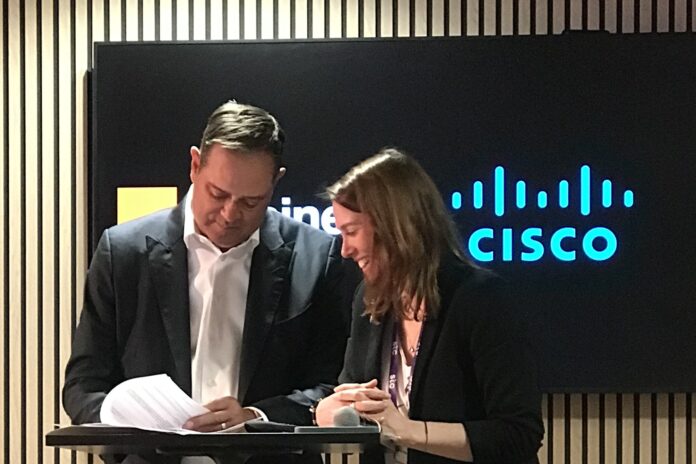The two signed a formal Memorandum of Understanding (MoU) which they say is the first of its kind
Orange Business and Cisco deepened their commitment to reduce greenhouse gas emissions with a formal Memorandum of Understanding (MoU) signed at MWC. They hope others will follow their lead.
Through their binding agreement, which is said to be a first of its kind, the pair aim to cut not only their own carbon emissions but those of their enterprise customers.
“Sustainability is an increasing part of the equation that our enterprise customers are dealing with when trying to optimise a business through digital. Sustainability is really going up in the agenda of CEOs all around the world… We see very clearly that our customers are putting sustainability at a higher place in the [requests for proposal] … and when they assess which providers they will select,” said Aliette Mousnier-Lompré, CEO of Orange Business (pictured above right).
Sustainability is a team sport
With their MoU, she said Cisco and Orange Business recognise that deepening efforts around sustainability is a “team sport”. Not least because emissions from across their supply chains are by far the biggest contributors to their carbon footprints.
Orange Business has reduced Scope 1 and Scope 2 emissions by half since 2019, but “the biggest part of Scope 3” – that is, emissions related to the digital solutions the operator provides to customers.
“To reduce Scope 3, it’s really about working along the entire supply chain. It’s an ecosystem approach. We cannot do this alone,” she said.
The MoU reflects an acknowledgment that companies cannot meet net zero targets by working in isolation and will need to work together.
Taking in all scopes
Orange aims to cut GHG emissions by 45% across all scopes by 2030, compared to a 2020 baseline, and has committed to reaching net zero by 2040. Cisco’s target is to reach net-zero GHG emissions across its value chain by 2040.
The company has also set a goal to cut “absolute Scope 3 emissions from purchased goods and services, upstream transportation and distribution, and use of sold Cisco products by 30% by 2030.”
The MoU covers four areas. The partners have agreed to work together on:
- Building a GHG emissions trajectory – the partners will share data to estimate GHG emissions related to Orange Business solutions that integrate Cisco technology with the aim of reducing emissions. Mousnier-Lompré noted this will be a first for the operator.
- Measuring carbon impact of products and services – Cisco will provide estimated carbon footprint data for their products sold by Orange Business. This will enable the operator to incorporate this data into its own emissions calculations and allow customers to make informed decisions when they select digital solutions. “You cannot improve what you’re not measuring,” she said.
- Accelerating circular economy practices – the partners will step up efforts to deploy reconditioned kit and collect old equipment for re-use and recycling, such as through the Cisco Refresh Program.
- Eco-designing joint products – the pair will adopt more eco-design principles to help Orange Business achieve its goal of offering 100% eco-designed solutions to customers.
Ahead of the rest of the world
“One of the big areas of focus that all our customers have, and I think European customers have been ahead of the rest of the world, is around sustainability. So this is a very exciting MoU for us…We’ve been partnering together for 30 years, and we appreciate everything that we do together,” said Chuck Robbins, Chair and CEO of Cisco (pictured above left), speaking at the MoU signing.
In the next year, the partners will get to work on the joint product trajectories and aim to be in a position to share the carbon footprint of their joint products.
Speaking during the Q&A, Laurent Godicheau, Chief Strategy, Partner & Sustainability Officer at Orange Business, said this is a model that could be replicated with other partners and Cisco could enter similar agreements with other service providers.
“We definitely believe it’s an ecosystem play. We even hope that we will replicate and give ideas to others even if it is not involving Orange or Cisco… We need to drive this effort collectively for the good of the planet,” he said.
Top partner
Orange Business started this initiative with Cisco because it is the operator’s “number one partner” over 30 years, but also because they have worked on sustainability before and are “not starting from scratch.”
For example, they have developed a smart office solution that manages conference rooms and energy consumption. In the Orange Velodrome in Marseille, the partners rolled out an on-demand Wi-Fi system that saved energy compared on “always-on” networks. Orange Business also uses Cisco’s One Box that combines multiple routing features into one unit, which uses 70% less energy and reduces environmental impact.
“We want to use this [MoU] as a lighthouse engagement” that can show others the “art of the possible,” said Vikas Butaney, Vice President, SD-WAN Cloud OnRamp and Industrial IoT at Cisco.



